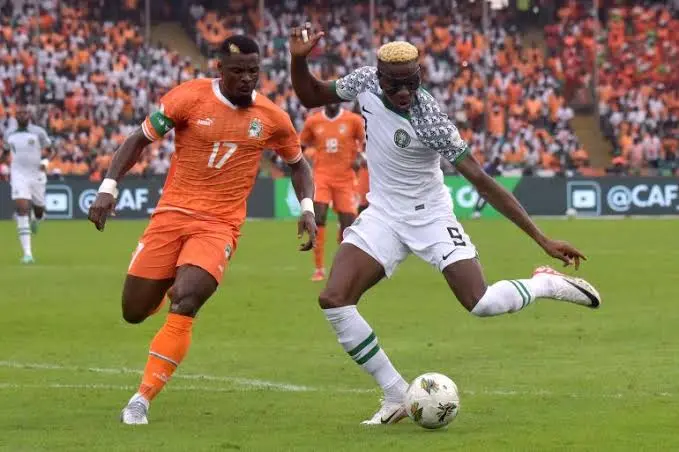AFCON 2023: Super Eagles battle with host nations set to welcome 60,000 fans
There is nothing sacrilegious about host nations losing in the Final match of the Africa Cup of Nations, as a number of host nations have come so close, seen the trophy displayed in front of their vociferous and passionate fans and yet failed to get their hands on the coveted prize.
In the fifth edition of the championship in 1965 (the competition’s founding nations were Egypt, Ethiopia, Sudan and South Africa, though South Africa eventually did not take part until 1996, a fall-out of her apartheid policies), hosts Tunisia lost 2-3 (after extra time) to defending champions Ghana at the Stade Chedli Zouiten in Tunis.
In 1982, Ghana was passing through a phase of harsh economic conditions, and military strongman Jerry John Rawlings said the government could not afford to send the Black Stars to Libya for the 13th AFCON. Libya’s strongman Moamer Ghadaffi bailed the team out by sending an aircraft to fly the Black Stars to Tripoli. In the opening match, both teams played a 2-2 draw.
Incidentally, they met in the Final two weeks later, with Ghana winning 7-6 after penalties following a 1-1 draw, Nigeriasoccernet.com writes.
In 2000, as co-hosts and staging the Final match, Nigeria forced Cameroon to a 2-2 draw at the National Stadium, Lagos and then lost the ensuing penalty shootout 3-4 to the Indomitable Lions.
However, some host nations have also had joy in the tournament’s history. Like Egypt beating Sudan 2-1 in Cairo in 1959; Ethiopia beating Egypt 4-2 in Addis Ababa in 1962; Ghana beating Sudan 3-0 in Accra in 1963; Sudan beating Ghana 1-0 in Khartoum in 1970; Ghana beating Uganda 2-0 in Accra in 1978; Nigeria defeating Algeria 3-0 in Lagos in 1980; Egypt defeating Cameroon on penalties in Cairo in 1986; Algeria beating Nigeria 1-0 in Algiers in 1990; South Africa beating Tunisia 2-0 in Johannesburg in 1996; Tunisia defeating Morocco 2-1 in Tunis in 2004 and; Egypt defeating Cote d’Ivoire on penalties in 2006.
While Nigeria’s victories have been within regulation time in 1980, 1994 and 2013, Cote d’Ivoire’s two wins have been after marathon penalty shootouts.
In 1992, with their star-man Abedi Pele suspended after receiving a red card in the semi final against Nigeria, Ghana struggled and could not find a way past the Ivorians. In the ensuing penalty shoot-out, Cote d’Ivoire triumphed 11-10, the trophy secured after defender Anthony Baffoe saw his kick saved by Alain Gouamene.
In 2015, they needed to defeat Ghana 9-8 in a penalty shootout to win in Bata, Equatorial Guinea.
Nigeria defeated Algeria 3-0 in the 1980 Final in Lagos, two of the goals from the boots of Segun Odegbami. In 1994, Emmanuel Amuneke scored both goals as the Eagles edged Zambia 2-1 in Tunis. In 2013, Sunday Mba’s early strike against Burkina Faso in Johannesburg was the only goal of the match.
This time, Nigeria’s progress has been relatively smooth, with a team that has shown good shape and proved to be near-impregnable. As they drew 1-1 with Equatorial Guinea, defeated Cote d’Ivoire, Guinea Bissau, Cameroon and Angola and edged South Africa after a penalty shootout, the only goal that Stanley Nwabali has conceded in open play has been that of Emilio Nsue on the opening day, when his vision was blocked to a shot at the edge of the box.
The Elephants have had a chequered tourney. Roarious 2-0 winners over Guinea Bissau, they were brought down to earth by Nigeria (0-1) and Equatorial Guinea (0-4). They were the last of the best four third-placed teams, sneaking into the Round of 16 after Hakim Ziyech’s goal eliminated Zambia. They equalized late on against Cup holders Senegal in the Round of 16 and then won on penalties.
In the quarter-finals, they were seconds away from being eliminated by Mali, before they found the leveller, and then secured a last-minute winner in extra time. Against Democratic Republic of Congo in the semi-finals, the Elephants held on and then won with a volley by Sebastien Haller.
On Sunday, there will be 60,000 fans at the Stade Olympique Alassane Ouattara in Ebimpé, but it is the team that wants it more that will drink from the Cup.
By Olaleye Oluwadamilola


Comments
This article has 0 comment(s) , give your comment